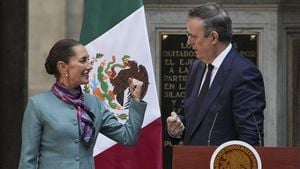The competitive race among South Korean universities has intensified as the Ministry of Education announces major changes to its Glocal University initiative. With ambitious plans to designate ten universities this year, schools are gearing up for what some are calling their last chance to secure significant funding and boost their innovation capabilities.
Initially, the Ministry had intended to select five universities each year until 2026, but feedback from institution heads drove them to expedite the decision-making process for the benefit of struggling local universities, according to the ministry's recent guidelines. By opting to make selections at once, the Ministry aims to alleviate the pressure of extended preparations and invigorate the innovation drive among these institutions.
This year's selection, highlighted by its notable intensity, targets areas, including Gwangju and Jeonnam, which have, until now, lacked designated universities. The stakes couldn’t be higher; schools hope to leverage the announced funding of 1 billion won (approximately $876,000) over five years to revitalize their programs and offerings.
One prominent contender, Chonnam National University, which had received preliminary recognition previously but failed to gain final status, is doubling down on its efforts this year. “We are preparing our vision and objective to challenge under equal conditions, and we want to do our best,” remarked a university representative, showcasing their determination to improve their application.
Likewise, local universities like Gwangju University are refocusing their strategies. The institution is now adopting collaborative tactics, merging resources and forming strategic alliances with other local private universities. “This year is virtually the last chance, and we are putting everything we can to succeed,” declared Ho-Nam University’s spokesperson, underscoring the urgency surrounding the situation.
Reflecting on the competitive environment, various universities are curbing their expectations as they prepare individual proposals of about five pages long. The Ministry has also indicated potential regional representation this time around, something not previously accounted for, giving rise to heightened hopes among those institutions yet to receive designation.
The pending evaluations will occur broadly from April to July, with hopes for official designation announcements by August. While maintaining their unique initiatives and character, universities must present their proposals focused on innovative practices to revive educational offerings. It’s become clear: those without designation will find it increasingly difficult to operate effectively moving forward.
“Government funding significantly impacts our financial stability,” expressed another university official candidly, addressing the financial repercussions tied to the designation outcomes.
Other universities are also gearing up rapidly to compete under these pressures. Notably, Gwangju is home to various institutions like Chosun University, which is now repository to new partnerships and alliances with local colleges to bolster their submission for Glocal status.
“We aim to utilize all resources effectively to surely obtain the designation this time,” stated the representative from Chosun, as they build on past experiences where teaming up previously did not yield the desired results.
The recently established Glocal University initiative by the South Korean government is intended to spur progressive developments within regional universities. Still, it places immense pressure on institutions to innovate continually and collaborate effectively, even amid limited timelines and strict evaluations. The current environment necessitates swift responses and actionable strategies among university administrations to improve their chance of being recognized and funded.
Overall, these developments indicate not just the individual ambitions of each university vying for attention but also the broader potential changes within South Korea’s higher education system as it evolves to meet contemporary demands for quality and innovation.



